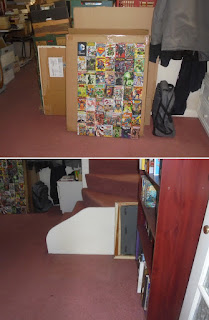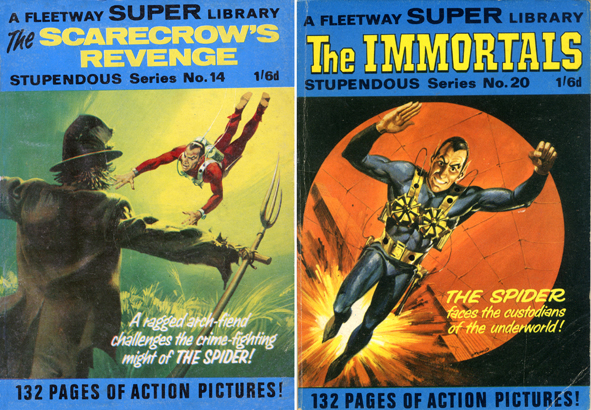Friday, November 18, 2022
Comic Cuts — 18 November 2022
Last week's column ended in a bit of a cliffhanger, as it was written in breaks taken from packing books into boxes. On Facebook I had put out a call to anyone who wanted some free books... let's rewind that a bit... a call to anyone who wanted a lot of free books. I posted a photo of a couple of hundred, but the photo was less than half of what I needed to get rid of.
A collector got in touch and headed over to chez Holland on Friday. "Bring a van," I said. "We're in an estate car," was the reply. I'll confess that I was a bit worried at that point that it might require two visits, because I was still packing and I already had ten quite large boxes filled, and while an estate car might have the space, would it be able to take the weight.
By the time I finished packing there were 18 boxes and 10 trays — the kind that supermarkets have their tomatoes delivered in. I've had dozens of them for years because they're big and stackable. but not so big that you can't carry them when they're full. You'll have seen them in photos I've posted, because we have them littered around the living room. Why? Well, I used them to store things in the attic at the house we previously rented, and they would go in the attic here if it wasn't for the fact that we had thick insulation installed soon after we moved in to try and cut our heating bills. Everything that would have gone into the attic had to be relocated, which is why the living room ended up looking like a charity shop's back room — trays and bags and boxes everywhere!
Back to the story... our intrepid collectors arrived at mid-day. We hit it off straight away, and spent the next hour chatting about collecting, chiefly paperbacks. One guy was fifties and sixties (Pan and Corgi all the way down the quality scale to Badger), the other a James Bond fan with a serious collection of Pan editions.
I was still convinced this was not going to be a one-off trip, but I was wrong. The car had an amazing capacity to swallow up box and box, and although one or two boxes were opened and their contents stuffed into gaps, everything was loaded up. Then it was "Good-bye!" as over a thousand books disappeared down the road towards their new home in Billericay.
We did a quick tot-up at the weekend and we think that the average box that we've packed up over the last two months has contained 35 books. One way or another, we've got rid of 34 boxes. The trays probably contain roughly the same... call it 30 books. Then there were a couple of bags of books, so maybe another 40 there and a couple of sales that amounted to another 40 books. I reckon — and this is a back of a fag packet guess — that we've disposed of 1500 books, with maybe 70 DVDs also gone. On top of that we've disposed of 300 magazines to the recycling.
Not a bad start!
Next step is to dismantle the mountain of boxes at the back of the living room and get rid of a few bits of furniture, including an unused chair, a pouffe that we used to use as a table, since replaced by an actual table, and a couple of old filing cabinets that I haven't used since we moved twelve years ago. So there will be plenty more of this kind of rambling in the foreseeable future.
Otherwise I have been writing introductions, entertaining guests (one guest, my Mum) and generally catching up with things. My research into the Fleetway Super Library series turned up a couple of interesting things. I've often described them as Britain's first original graphic novels, running to over 120 pages per issue, although it could be argued that the complete stories in early issues of Thriller Comics might also be called graphic novels. Length might preclude them, but these, the Super Libraries, undoubtedly are.
I always wondered why they came to such a sudden, crashing halt in January 1968. There was a general downturn in sales in the late 1960s and the market was fairly swamped with pocket libraries at the time, although quite a few had disappeared when Thorpe & Porter went bankrupt in 1966. So what happened in late 1967 that might have proved fatal? As usual, I suspect it all came down to costs and bottom lines. In mid-November 1967, the pound was devalued and the cost of printing the books — they were printed in Italy — suddenly jumped 14%. And since the artwork was sourced from Italy, Spain and Argentina, the wages for many artists also slumped, since they were paid in sterling.
I'm still looking at the full impact of what was happening around that period, as it is an interesting one in British comics history, although writing it all up will have to wait until I'm rich or retired. Not that I'm complaining too loudly at the moment, as my next task is to sit down and read some old Spider comics. It's a tough job, but somebody has to do it...!






No comments:
Post a Comment